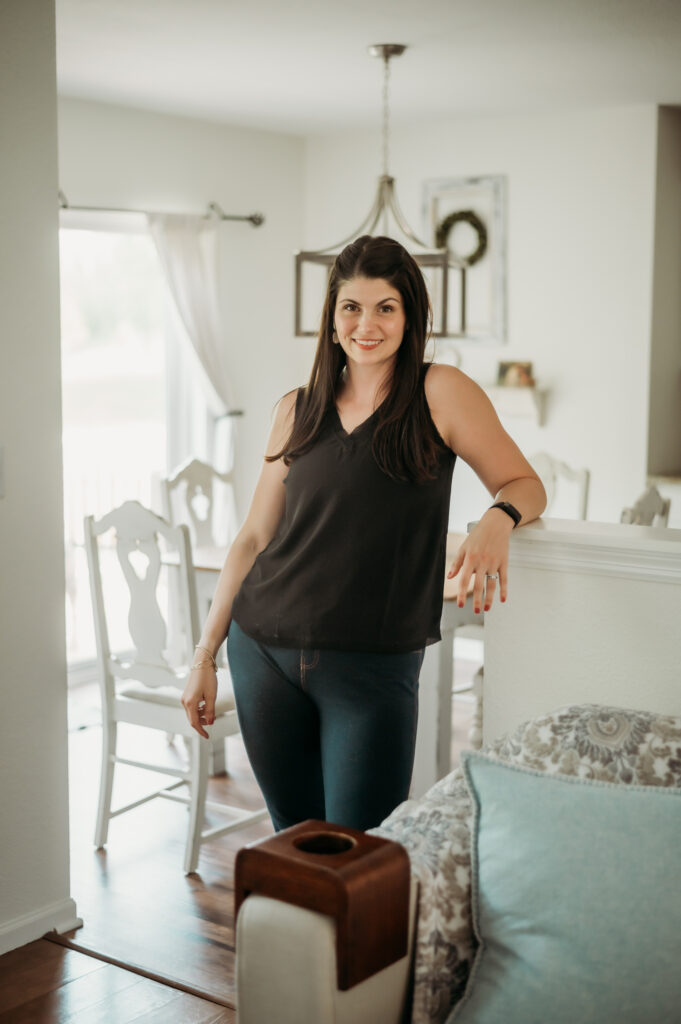A few weeks ago, I shared a little bit about Postpartum anxiety and Postpartum OCD (two conditions that don’t get as much attention as postpartum depression but can be equally debilitating). Today, I want to take that one step further and talk about postpartum separation anxiety, another condition that goes beyond the typical concerns of new motherhood, where new moms feel intense fear and anxiety about being separated from their newborns. I’m going to share a little bit about what postpartum separation anxiety is, its symptoms, causes, and triggers, and hopefully provide some information to help you manage it effectively.
If you or someone you love is currently struggling with this, just know that there is so much hope (and I’m saying this as a licensed professional counselor with over 15 years of experience working with people who have OCD and anxiety). I’ve also been struggling with that damn ‘fear voice’ of OCD and anxiety since I was a kid. I know what it’s like and this is a judgment-free zone, okay?

What is postpartum separation anxiety?
Put simply, Postpartum separation anxiety is a condition that affects some new mothers, characterized by intense fear and anxiety about being separated from their newborn. This anxiety goes beyond the usual concerns of new motherhood. In fact, it can quickly manifest as an overwhelming worry that something bad will happen to the baby if they are not constantly together.
As if having a brand new baby isn’t overwhelming enough, new mothers experiencing postpartum separation anxiety may avoid leaving their baby with others, even for short periods, and may feel distressed or panicked at the thought of being apart. This means that it’s hard for them to get support, rest, or indulge in any necessary self-care.
Common symptoms experienced by new parents with postpartum separation anxiety
To better explain what postpartum separation anxiety really looks like, here are a few examples of common symptoms:
Constant Worry: Again, this is more than “normal” new parent worries. When you are struggling with postpartum separation anxiety, you’ll likely feel an overwhelming and persistent worry about the baby’s safety and well-being when not in direct sight or care.
Avoidance of Separation (and Intense Distress If It Does Occur): Next, if you’re experiencing postpartum, separation anxiety, you will likely feel a strong reluctance or refusal to leave your baby with caregivers, family members, or even the other parent, even for short periods. Should a separation occur (even if you’re just taking a shower!), you’ll likely feel intense feelings of distress, panic, or anxiety, even if the separation is brief and the baby is in a safe environment.
Sleep Disruptions: A lack of sleep makes everything worse, and postpartum anxiety is no exception. For new moms experiencing postpartum anxiety, you may have difficulty sleeping or resting due to frequent checking on your baby throughout the night to ensure their safety.
Physical Symptoms: Often when we talk about anxiety, it’s the mental symptoms that are front-and-center but anxiety can manifest into physical symptoms too. New moms may experience physical manifestations of anxiety, such as increased heart rate, sweating, trembling, or nausea when anticipating or experiencing separation from the baby.
Need for Constant Reassurance: Last but not least, frequently seeking reassurance from others about the baby’s safety and well-being, even when there is no rational basis for concern, is a common symptom of postpartum anxiety.
I believe that recognizing these symptoms is the first step. Please hear me when I say: YOUR well-being matters too!

Causes of Postpartum Separation Anxiety
While I want to bring awareness to the fact that anxiety does not discriminate (and can happen to anyone), there are a few things that can increase the risk of postpartum anxiety so I want to talk about those next.
First, there are dramatic hormonal shifts that occur after childbirth. Levels of estrogen and progesterone, which rise during pregnancy, drop sharply after delivery. As you can imagine, these hormonal changes can affect your mood and anxiety levels, making you more susceptible to anxiety disorders, including postpartum separation anxiety.
If that wasn’t enough, new moms often feel an overwhelming sense of responsibility for their newborn’s safety and well-being. This heightened sense of duty can take what are normal parental concerns and exacerbate into excessive worry and anxiety about being separated from their baby.
On top of that, traumatic birth experiences or complications during delivery escalate things, leaving mothers feeling vulnerable and anxious about their baby’s health, which only further leads to an increased fear of separation. Similarly, lack of support from partners, family, or friends can all contribute to increased anxiety.
Social isolation, in particular, can make new mothers feel solely responsible for their baby’s care, heightening their fear of leaving their baby with others. That’s one of the reasons I talk about Exposure and Response Prevention (ERP) inside my OCD and Anxiety Recovery Blueprint. The longer you avoid something that makes you anxious, the more your anxiety takes over your life.
Lastly, let’s briefly touch on the pressure new mothers get from society. There is a lot of pressure to be a perfect mother and the stigma surrounding maternal mental health issues can prevent mothers from seeking help and support. In my experience, this can be especially true for mothers experiencing intrusive thoughts.
Dealing with Postpartum Separation Anxiety
If you’re struggling with anxiety, especially postpartum separation anxiety, I want you to know that there’s hope and help available. My course, the OCD and Anxiety Recovery Blueprint, is designed as a self-help option to support you through this challenging time (and have in your mental health toolbox whenever you need it!). I’ve been helping clients with OCD and anxiety since 2008, and I’ve personally dealt with these issues since I was a kid, so I truly understand what you’re going through and how scary it is. You’re not alone in this!
most popular episodes
Love my podcast?
Episode 112: Postpartum OCD and False Memory OCD
Imagine how in depth I can go in an online course. Instantly downloadable and game-changing. Take the next step towards an amazing life.